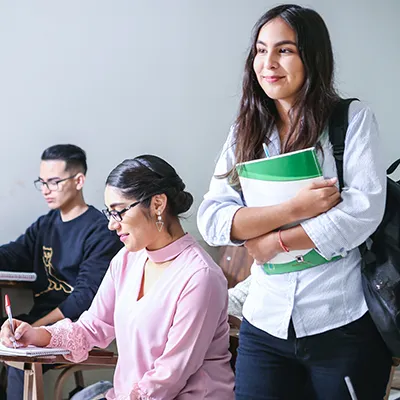They haven’t been this excited since they got their college acceptance letter. Now, they’ve been accepted to a study abroad program.
Of course you’re excited for them, too. But you’re a parent, so you also have lots of questions. Will they be safe? How will we pay for this? How do I prepare my child to study abroad?
First, take comfort in the knowledge that they’ll be having an incredible adventure. While they’re abroad, they’ll make international friendships, expand their worldview, grow their confidence and self-awareness, and build all kinds of skills that future employers look for. In fact, some research shows that 97% of those who study abroad find a job within a year of graduating compared to just 49% of all college graduates.
Before they even get their passport, pack their bags, or board their flight, you can help set them up for success.
Tips for Parents of Students Studying Abroad
1. Talk to them about money.
Expenses add up in foreign countries, especially those where the local currency is worth more than your home currency. Make sure you and your student both know the exchange rate and how it might differ if they get money at a bank versus the window at the airport or use their credit card.
Also talk to them about sneaky credit card fees. Not all cards have international transaction fees. But for those that do, the fees can add up quickly. They’ll be charged every time they use their card to withdraw money, buy a snack or meal, purchase a souvenir, or book a weekend bus trip.
You can also help them by advising on a budget and arming them with the skills to manage their money well while they’re abroad.
How can I help my student pay for their study abroad trip?
This discussion is unique for every family and will depend on your own financial situation. Short of paying all their fees, you could try helping them with a few pre-trip purchases. New luggage, sturdy walking shoes, and plane tickets (if you’re feeling generous) go a long way.
You can also help them fill out financial aid and scholarship forms to pay for their trip. There’s a lot of paperwork involved in a study abroad, and your support as they wade through it all can be beneficial.
2. Help them stay safe.
Depending on your student’s travel experience, they may need some coaching about life in another country. Remember that even experienced travelers can benefit from a bit of advice; taking a two-week vacation is very different from living in another country for six months.
How can I stay safe in another country?
Staying safe in another country covers everything from the common sense you use at home — walking with a buddy at night, never leaving your drink unattended at a bar — to being aware of cultural norms. Knowing the written and unwritten rules of the land will keep your student from making a cultural misstep that could land them in hot water, even if it’s inadvertent.
HuffPost has a good list to help you start the conversation, so your student knows how to handle themselves during their study abroad.
What about food safety?
Trying out all the new cuisines is one of the best parts of studying abroad. Make sure your student is aware of food safety.
Can they drink the water in another country? If they want to eat at a food stall on the street, do they know how to pick one that’s safe? Are there foods they should avoid, such as unpasteurized dairy products or uncooked vegetables?
Do I need travel insurance for study abroad?
You can also use travel insurance from Seven Corners to make sure your child is protected if they get sick or hurt while traveling. Not only does travel medical insurance help cover expenses if they need medical treatment, but they’ll also have access to Seven Corners emergency travel assistance services 24/7.
Our Assist Team can help you both navigate a foreign health care system should the need arise. This includes helping your student find medical care at their location, recommending translation services if necessary, and more.
Even if your student is traveling with a group, these services can prove invaluable, especially if they plan to take a side trip on their own some weekend or won’t have access to school administrators at all times.
Seven Corners customer Alysan was studying in Ghana when she contracted malaria. Watch Alysan’s story and see how Seven Corners worked with her and her mom to get Alysan the medical care she needed and arranged to get her home comfortably.
What should I do in an emergency abroad?
In the unfortunate event your student does have an emergency, it will go a long way to solving the problem if they have a plan in place for how to handle it. Create a list of emergency contacts and make sure they have access to it in multiple ways: on paper, in the cloud, saved on their phone.
Talk about what to do in a medical emergency. When is it appropriate to go to the hospital? When should they call their doctor at home and schedule a telehealth appointment?
You might have them talk directly with their doctor about this before they leave. They’ll want to get a checkup and necessary vaccines anyway. And if they have existing health conditions or are concerned about managing their mental health through upcoming changes, making their doctor part of the conversation from the start can help ease troubles later.
3. Open the lines of communication.
Not all cell phones work overseas. Find out if your student will have coverage at their destination or if you can add international coverage to your service. No one wants to pay international roaming charges.
Another option is buying a SIM card from the country where they’re staying. It’s usually inexpensive and will allow you to reach them at any time via the same mobile device they use at home.
Facebook Messenger, Skype, and Google Hangouts are only a few of the Wi-Fi-based applications that will get the job done.
WhatsApp is also a popular app for travelers that allows you to text and call via the internet. Your student can use WhatsApp to contact Seven Corners if they need assistance during their trip as well.
Resist the urge to contact your child every day unless you truly think something is wrong. It’s important that they learn to work through challenges and resolve disputes on their own. And while some students find it comforting to hear a parent’s voice every day, others find it increases their homesickness. Give them time and space to be independent.
What should I include in a care package?
Sending a care package is a great way to stay in touch. When your child’s been gone for a few months, they might start craving things from back home, even something as simple as peanut butter. Try these ideas for what to include in your care package:
- Their favorite candy or snack foods
- Notes from friends and family
- Their favorite brand of personal hygiene items if they can’t get it abroad
- Small decorations to help them celebrate a birthday or upcoming holiday
- Taco seasoning if they love homemade Mexican night (trust us when we say taco seasoning tastes different in different countries)
Surprising them with a few of their favorite things shows that you’re thinking of them, which is comforting on days they feel extra homesick.
4. Help them decide what to pack for their study abroad.
Make sure your student remembers the essentials: important documents (passport, study abroad paperwork, proof of insurance, visa), medications, their laptop, even appropriate clothing.
They don’t need to pack their entire closet — more on that below — but you might want to make sure they have the right kind of clothing. Factor in the weather they’ll encounter, the activities they have scheduled, and the culture where they’ll be living. Headscarves, long pants, and closed-toed shoes could be required depending on cultural norms.
How do I pack light for international travel?
One of the more important, and often overlooked, things is packing light. Half of what they think they “need” will seem a lot less essential when they have to haul it through the airport or up another flight of stairs to their new apartment or dorm. The University of Tennessee Chattanooga even recommends you have them walk around the house with their luggage to make sure they can manage it.
Items like blankets, pillows, and kitchen accessories can be purchased in their new country and donated at the end of their trip. Previous study abroad students might even have left some of these behind for the next cohort.
Former Seven Corners writer Grace Lower studied abroad extensively during her college career. Check out what she packed for her semester abroad … what she wishes she’d left at home.
5. Plan a visit.
Depending on the length of their study abroad experience and if your student is willing to host you, this could be a great opportunity to take a vacation of your own.
Wait a few months into their study abroad before you go, though. You want them to have time to immerse themselves and create their own routines before you show up and everyone falls back into old habits.
Waiting also gives them time to learn about their host country and city, so they can properly show off their new home. How amazing will it be to have your own personal guide, showing you around like a local?
Prepare with Travel Insurance for Studying Abroad.
Just when you think you have everything figured out, you’ll come up with another question you never thought to ask. (Inevitably, it will be at 3 a.m.)
We know you’ll have questions about travel insurance. Help your student decide the best kind of protection for their trip so you can both enjoy peace of mind while they’re out there exploring new lands. Get a quick quote online to review your options or contact our licensed agents today.
Travel Like a Pro with The Wayfinder
Did you enjoy this blog? Get more articles like it before anyone else when you subscribe to our monthly newsletter, The Wayfinder.





